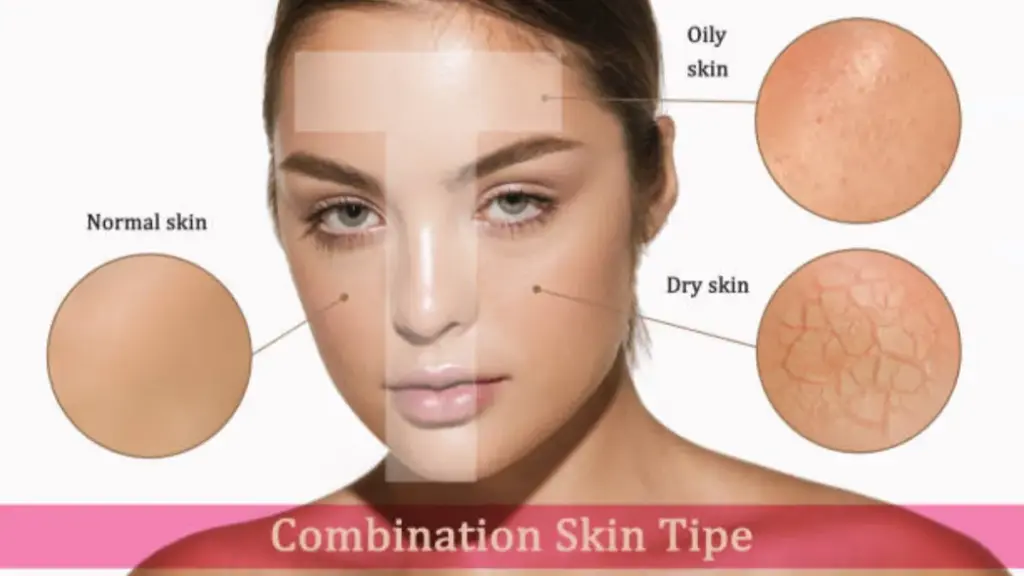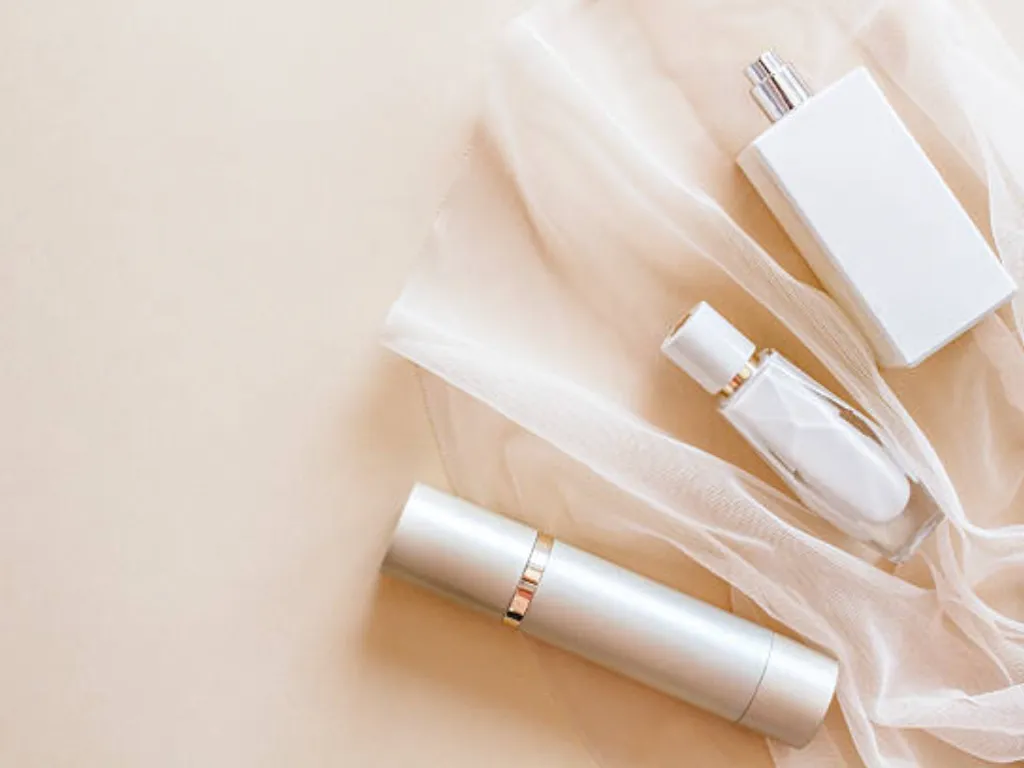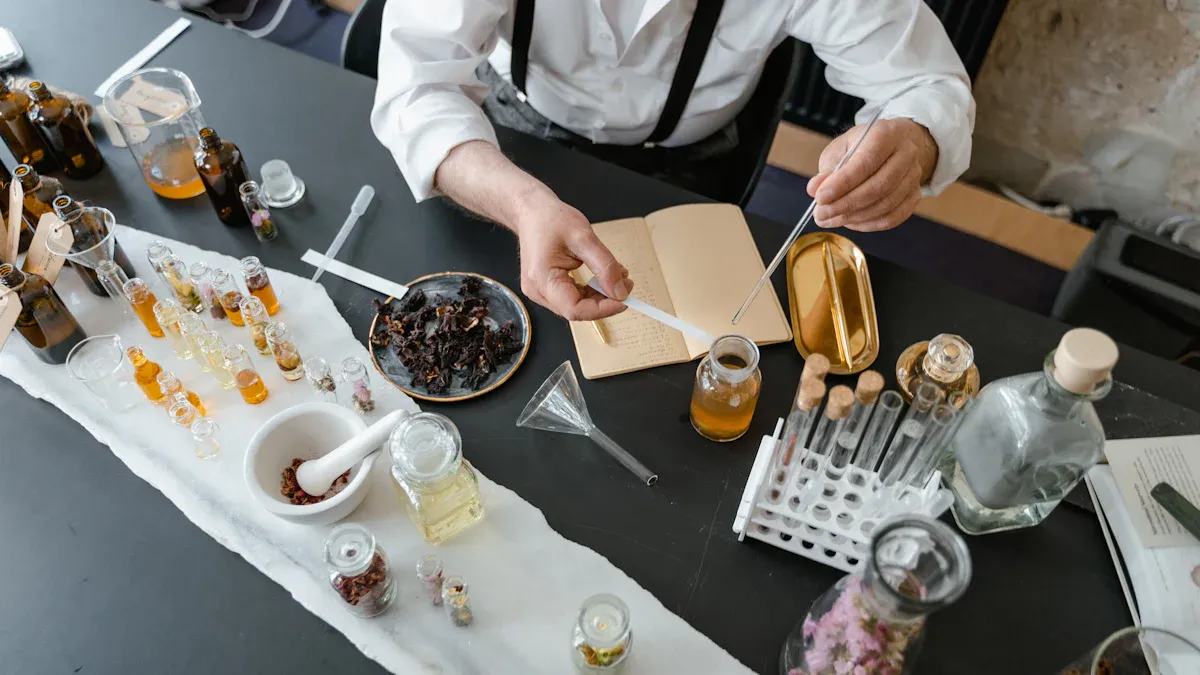
Certified cosmetics manufacturing plays a crucial role in ensuring the safety and quality of products you use daily. It provides the assurance that every step, Von der Formulierung bis zur Verpackung, meets strict regulatory standards. This commitment to quality builds consumer trust, as 99% of online shoppers Und 85% of in-store buyers rely on reviews when choosing beauty products. Zusätzlich, 79% of consumers prioritize star ratings, highlighting the importance of reliable manufacturing practices. Durch die Einhaltung dieser Standards, brands not only protect users but also contribute to ethical and sustainable production.
Key Certifications in Certified Cosmetics Manufacturing
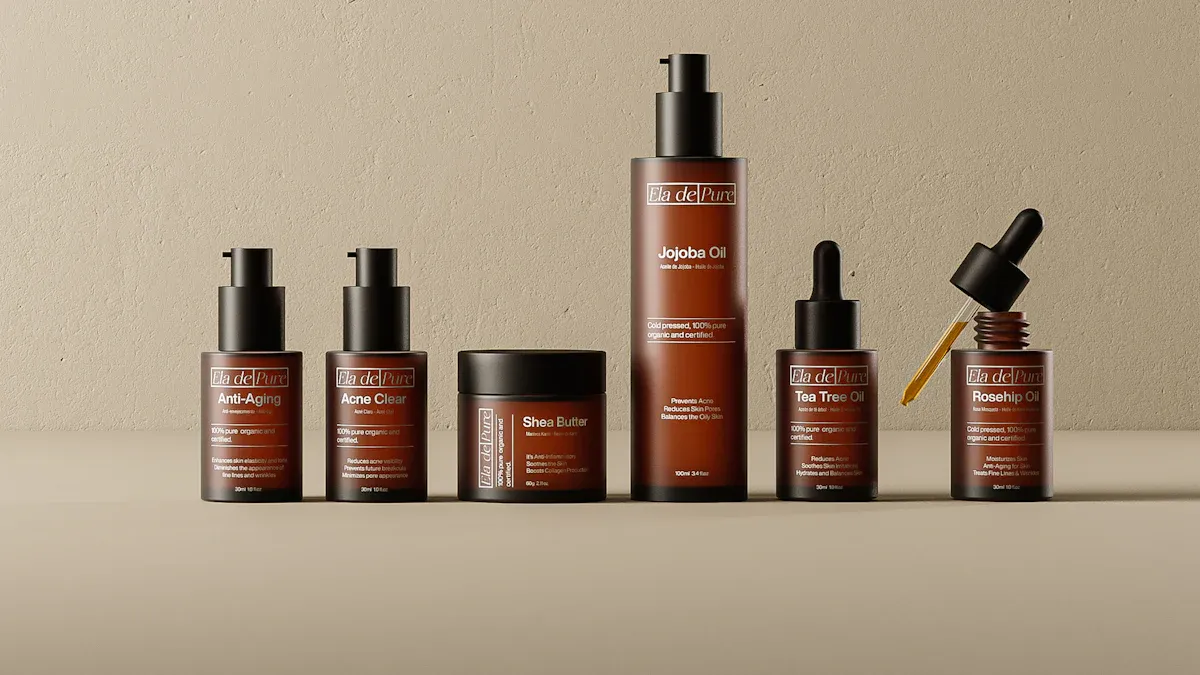
GMP Certification and Its Role in Safety
Gute Herstellungspraktiken (GMP) form the backbone of certified cosmetics manufacturing. These standards ensure that every product is made under strict safety and hygiene protocols. GMP certification verifies that your manufacturing processes meet the highest safety requirements, from raw material handling to final packaging. This certification minimizes risks such as contamination, ensuring that your cosmetics are safe for consumers.
GMP also emphasizes proper documentation and traceability. By maintaining detailed records, you can track every batch and quickly address any quality concerns. This level of accountability not only protects consumers but also strengthens your brand’s reputation. When you adhere to GMP, you demonstrate a commitment to producing high-quality products that meet regulatory standards.
ISO 22716 Standards for Quality Control
ISO 22716 is the international standard for good manufacturing practices in the cosmetics industry. It provides a comprehensive framework for quality control, covering every aspect of production. From sourcing natural ingredients to packaging, ISO 22716 ensures that your processes align with global standards. This certification helps you maintain consistency, which is crucial for building consumer trust.
One of the key benefits of ISO 22716 is its focus on risk management. By identifying potential issues early, you can prevent costly mistakes and maintain product reliability. This standard also promotes continuous improvement, encouraging you to refine your processes and stay ahead in a competitive market. For brands looking to expand globally, ISO 22716 certification is essential for meeting international regulations.
Organic and Natural Product Certifications
Organic and natural product certifications have become increasingly important in today’s cosmetics market. These certificates assure consumers that your products are free from harmful chemicals, pesticides, and GMOs. They also verify that your ingredients are sustainably sourced, aligning with the growing demand for ethical and eco-friendly beauty solutions.
Certifications act as a mark of legitimacy, assuring customers that products are natural or organic.
They enhance consumer confidence by verifying that ingredients are sustainably sourced and free from harmful chemicals.
In a market with frequent misleading claims, certified products are seen as reliable, demonstrating a brand’s commitment to ethical practices.
The natural cosmetics market is projected to reach $35.96 Milliarden von 2032, driven by consumer demand for clean and sustainable beauty solutions. By obtaining organic certifications, you position your brand as a leader in this growing industry. These certifications not only attract eco-conscious consumers but also set your products apart in a crowded marketplace.
Cruelty-Free and Vegan Certifications
Cruelty-free and vegan certifications have become essential for brands that prioritize ethical cosmetics. These certificates assure consumers that no animal testing or animal-derived ingredients are involved in your products. By obtaining these certifications, you align your brand with the growing demand for compassionate and sustainable beauty solutions.
Cruelty-free certification focuses on ensuring that your manufacturing processes avoid animal testing at every stage. This includes testing raw materials, Formulierungen, and final products. Organizations like Leaping Bunny and PETA provide globally recognized cruelty-free certificates. These certificates not only appeal to animal lovers but also demonstrate your commitment to humane practices.
Vegan certification goes a step further by verifying that your cosmetics contain no animal-derived ingredients. Common ingredients like beeswax, lanolin, and collagen are replaced with plant-based alternatives. Vegan Action and The Vegan Society are two organizations that offer trusted vegan certifications. These certifications cater to consumers seeking products that align with their ethical and dietary values.
By obtaining cruelty-free and vegan certifications, you position your brand as a leader in ethical cosmetics. These certifications enhance your reputation, attract eco-conscious consumers, and differentiate your products in a competitive market. They also contribute to a more sustainable future by reducing reliance on animal testing and ingredients.
Halal and Kosher Certifications for Global Markets
Halal and kosher certifications open doors to diverse global markets by ensuring your cosmetics meet specific religious and cultural requirements. These certifications verify that your products adhere to strict guidelines, making them suitable for Muslim and Jewish consumers.
Halal certification ensures that your cosmetics comply with Islamic principles. This includes using permissible ingredients and avoiding alcohol or animal-derived substances not considered halal. Organizations like the Halal Certification Authority and the Islamic Food and Nutrition Council of America (IFANCA) provide halal certificates. These certificates help you cater to the growing demand for halal cosmetics, especially in regions with significant Muslim populations.
Kosher certification guarantees that your products meet Jewish dietary laws. This involves ensuring that ingredients and manufacturing processes comply with kosher standards. Kosher certificates are issued by organizations like the Orthodox Union (OU) and Star-K. These certifications allow you to serve Jewish consumers who seek cosmetics that align with their religious beliefs.
Both halal and kosher certifications demonstrate your commitment to inclusivity and cultural sensitivity. They enable you to expand your reach into international markets and build trust with diverse consumer groups. By obtaining these certifications, you show respect for religious practices while enhancing your brand’s global appeal.
Safety Assessments and Quality Assurance
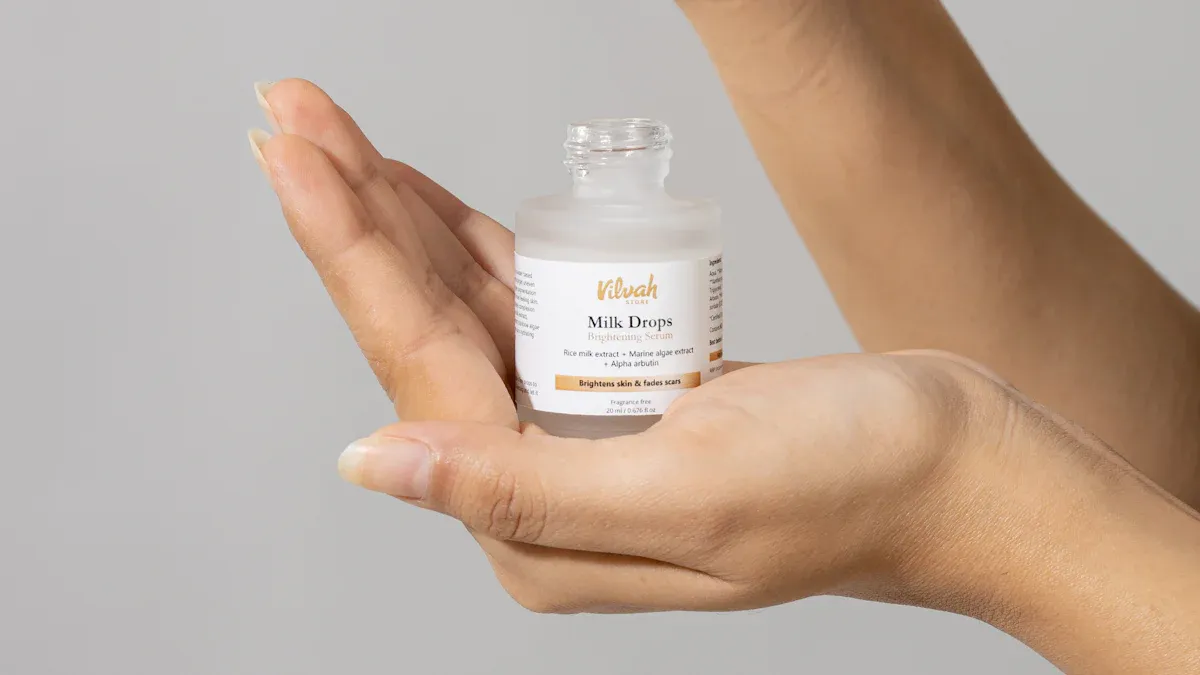
Importance of Safety Testing in Cosmetics
Safety assessments are essential for ensuring cosmetic product safety reports meet regulatory standards. These assessments protect consumers by identifying potential risks before products reach the market. Cosmetic testing evaluates ingredients, Formulierungen, and finished products to ensure they are safe for use.
Safety testing methods include patch tests, which assess skin reactions, and ocular tests, which evaluate eye irritation. These tests help you identify allergens or irritants that could harm users. By conducting thorough safety assessments, you demonstrate your commitment to consumer well-being and regulatory compliance.
Safety testing also builds trust. When consumers know your products undergo rigorous evaluations, they feel confident in your brand. This trust translates into loyalty and positive reviews, which are vital for success in the cosmetics industry.
Stability and Shelf-Life Testing for Product Reliability
Stability and shelf-life testing ensure your cosmetics remain effective and safe throughout their intended lifespan. These tests predict how products will perform under various conditions, helping you maintain quality and reliability.
Key methods include:
Beschleunigte Alterungstests: Simulate extreme conditions to predict product longevity.
Mikrobielle Stabilität: Verify preservatives prevent microbial growth over time.
Real-Time Stability Studies: Store products under normal conditions to provide accurate shelf-life predictions.
Stability testing prevents issues like separation, discoloration, or loss of efficacy. Reliable products enhance your reputation and reduce the risk of recalls. By investing in these tests, you ensure your cosmetics meet consumer expectations and regulatory requirements.
Microbiological Testing to Prevent Contamination
Microbiological testing safeguards your cosmetics against contamination, ensuring they remain safe for use. This process identifies harmful microorganisms that could compromise product quality or pose health risks.
Testing Procedure | Beschreibung |
|---|---|
Enrichment in Modified Letheen Broth | Optimizes recovery of potential pathogens from samples. |
Identification on Blood Agar and MacConkey Agar Plates | Determines the presence of microbial contaminants. |
Growth Promotion Characteristics | Assesses media effectiveness for microorganism growth during testing. |
Total Aerobic Plate Count | Evaluates microbial load beyond USP indicator organisms. |
Routine Testing Recommendations | Includes tests for Salmonella, E. Coli, P. aeruginosa, and S. Aureus. |
Microbiological testing ensures your manufacturing processes meet safety standards. By preventing contamination, you protect consumers and maintain product integrity. These tests are vital for building trust and ensuring consistent quality in certified cosmetics manufacturing.
Batch Testing and Traceability in Manufacturing
Batch testing ensures that every product meets the highest quality standards before reaching consumers. This process involves testing samples from each production batch to verify consistency, effectiveness, und Sicherheit. Durch die Durchführung dieser Tests, you can identify and address any issues early, preventing defective products from entering the market.
Traceability plays a crucial role in certified cosmetics manufacturing. It allows you to track every ingredient and process involved in creating a product. This system ensures transparency and accountability, which are essential for maintaining consumer trust. Zum Beispiel, if a problem arises, traceability helps you pinpoint the source and take corrective action quickly.
To implement effective traceability, you should maintain detailed records of raw materials, production processes, and distribution. Using digital tools like barcodes or QR codes can simplify this process. These tools enable you to monitor the entire supply chain, ensuring compliance with regulatory standards and enhancing product reliability.
Batch testing and traceability work together to uphold the quality of your cosmetics. They help you meet regulatory requirements, protect consumers, and strengthen your brand’s reputation.
Quality Control Protocols for Certified Products
Quality control protocols are the backbone of certified cosmetics manufacturing. These protocols ensure that every product meets strict standards for performance, Sicherheit, and reliability. By following these guidelines, you can consistently deliver high-quality products that satisfy consumer expectations.
Key quality control measures include:
Raw Material Inspection: Verify that all ingredients meet purity and safety standards.
In-Process Checks: Monitor production stages to ensure consistency and prevent errors.
Final Product Testing: Evaluate finished products for appearance, Textur, und Leistung.
You should also establish standard operating procedures (SOPs) for every step of the manufacturing process. These SOPs provide clear instructions for your team, reducing the risk of mistakes and ensuring uniformity across batches.
Regular audits and inspections further enhance quality control. These evaluations help you identify areas for improvement and maintain compliance with industry standards. By prioritizing quality control, you demonstrate your commitment to excellence and build lasting trust with your customers.
Regulatory Compliance in Cosmetics Manufacturing
Understanding regulatory compliance is essential for certified cosmetics manufacturing. It ensures your products meet safety, Qualität, and ethical standards while adhering to local and international laws. By following these guidelines, you can protect consumers, avoid legal issues, and build trust in your brand.
FDA Guidelines and MoCRA Requirements
The Food and Drug Administration (FDA) plays a significant role in regulating cosmetics in the United States. To achieve FDA compliance, you must follow the Modernization of Cosmetics Regulation Act (MoCRA), which was introduced to enhance product safety and transparency. MoCRA requires you to register your facility, list your products, and maintain detailed records of ingredients and formulations.
You must also ensure that your products are free from harmful substances and properly labeled. The FDA mandates that all ingredients be listed on the packaging, allowing consumers to make informed choices. Regular safety assessments and testing are crucial to meet these requirements. By adhering to FDA guidelines, you demonstrate your commitment to producing safe and reliable cosmetics.
EU Cosmetics Regulation and PIF Documentation
If you plan to sell your products in the European Union, you must comply with the EU Cosmetics Regulation (EC No. 1223/2009). This regulation sets strict standards for product safety, Beschriftung, and ingredient transparency. One of the key requirements is the creation of a Product Information File (PIF), which serves as a comprehensive record of your product’s safety and compliance.
The PIF includes details such as the product’s formulation, manufacturing process, and safety assessments. It also contains information about the responsible person or entity overseeing compliance. By maintaining an up-to-date PIF, you can ensure your products meet EU regulations and are ready for market entry. This documentation not only protects consumers but also enhances your brand’s credibility in the global market.
Labeling and Ingredient Transparency Standards
Transparent labeling and ingredient disclosure are critical components of regulatory compliance. Many regions require you to list all ingredients on your product’s packaging, emphasizing the importance of honesty and clarity. Conducting a thorough ingredient inventory helps you determine the regulatory status of each component, ensuring compliance with local and international standards.
Consumers increasingly demand transparency in cosmetics. They want to know what goes into the products they use and how those ingredients impact their health and the environment. By providing clear and accurate information, you can build trust and loyalty among your customers. A robust communication strategy for ingredient information is essential to meet these expectations and regulatory requirements.
Transparent labeling is a legal requirement in many regions, ensuring compliance with regulations.
Conducting an ingredient inventory helps you disclose necessary information to authorities and consumers.
Staying updated with reliable sources of information is crucial for navigating varying regulations across markets.
A strong communication strategy for ingredient transparency meets both regulatory standards and consumer demands.
Incorporating ethical sourcing practices and sustainability initiatives further strengthens your compliance efforts. Ingredient traceability ensures you can track the journey of raw materials from source to shelf, meeting regulatory standards. Building strong relationships with ethical suppliers promotes fair trade and adherence to sourcing regulations. Certifications like cruelty-free, organisch, and fair trade enhance your brand’s reputation and demonstrate your commitment to sustainability.
By prioritizing labeling and ingredient transparency, you align your brand with consumer values and regulatory expectations. This approach not only ensures compliance but also positions your products as trustworthy and high-quality in a competitive market.
Ethical Sourcing and Sustainability Practices
Ethical sourcing ensures that the ingredients in your cosmetics come from responsible suppliers. This practice prioritizes fair treatment of workers, environmental protection, and community well-being. By choosing ethical suppliers, you support sustainable farming methods and reduce harm to ecosystems. Zum Beispiel, sourcing organic shea butter from cooperatives in Africa helps empower local communities while preserving biodiversity.
Sustainability practices go hand-in-hand with ethical sourcing. You can minimize your environmental impact by using recyclable packaging, Abfall reduzieren, and conserving energy during production. Many brands also adopt carbon-neutral initiatives to offset emissions. These efforts demonstrate your commitment to protecting the planet and resonate with eco-conscious consumers.
To implement ethical sourcing and sustainability, you should build strong relationships with suppliers who share your values. Conduct audits to verify their practices and ensure compliance with industry standards. Certifications like Fair Trade and Rainforest Alliance can further validate your efforts. These steps not only enhance your brand’s reputation but also contribute to a healthier planet.
Tipp: Highlight your ethical and sustainable practices in your marketing materials. Consumers increasingly prefer brands that align with their values.
Adherence to Local and International Laws
Compliance with laws ensures your cosmetics meet safety and quality standards across different markets. Each region has unique regulations that govern manufacturing, Beschriftung, and distribution. Zum Beispiel, the United States requires adherence to FDA guidelines, while the European Union mandates compliance with the EU Cosmetics Regulation.
To navigate these laws, you should stay informed about updates and changes. Regularly review your processes to ensure they align with local and international requirements. Maintaining detailed records of formulations, safety assessments, and ingredient sourcing helps you demonstrate compliance during inspections.
International trade adds complexity to legal adherence. Exporting cosmetics requires understanding customs regulations, tariffs, and documentation. Partnering with experienced logistics providers can simplify this process. By ensuring compliance with all applicable laws, you protect your brand from legal risks and build trust with consumers worldwide.
Notiz: Investing in legal expertise can save you time and prevent costly mistakes. A knowledgeable team ensures your products meet regulatory standards in every market.
Importance of Certification for Cosmetics Manufacturers
Building Consumer Trust Through Certification
Certifications play a vital role in building consumer trust. They validate the safety and quality of your cosmetics, giving customers confidence in your products. In a market where transparency matters, certifications act as proof that your brand meets high standards. They show that you prioritize ethical practices and safe formulations, which resonate with today’s informed buyers.
Zertifizierungen enhance consumer trust by ensuring product safety.
They reflect your commitment to ethical and sustainable practices.
They improve your brand’s reputation in a competitive market.
When customers see certified labels, they feel reassured about their purchase. This trust leads to loyalty and positive word-of-mouth, which are essential for long-term success. By obtaining certifications, you demonstrate that your brand values integrity and quality.
Ensuring Market Access and Global Trade Opportunities
Certifications open doors to new markets and global trade. Many countries require specific certifications for cosmetics to enter their markets. Zum Beispiel, halal or kosher certifications allow you to cater to diverse cultural and religious groups. Ähnlich, cruelty-free and vegan certifications appeal to eco-conscious consumers worldwide.
Meeting international standards also simplifies the export process. Zertifizierungen wie ISO 22716 ensure your products comply with global regulations, making it easier to expand your reach. By investing in certifications, you position your brand for growth and establish a presence in competitive markets.
Differentiating Products in a Competitive Market
In a crowded cosmetics market, certifications help your products stand out. They serve as a mark of quality and reliability, setting you apart from competitors. Consumers often choose certified products over uncertified ones because they associate certifications with trust and safety.
Highlighting your certifications in marketing materials can attract attention and build credibility. Zum Beispiel, organic or natural product certifications appeal to buyers seeking clean beauty solutions. By showcasing your certifications, you emphasize your commitment to excellence and gain a competitive edge.
Mitigating Legal and Financial Risks
Understanding and addressing legal risks is essential for protecting your cosmetics business. Non-compliance with regulations can lead to fines, product recalls, or even lawsuits. By obtaining legal and ethical compliance certifications, you ensure that your products meet safety and quality standards. These certifications act as a safeguard, reducing the likelihood of legal disputes.
You should also prioritize consumer safety certifications. These certifications demonstrate that your products have undergone rigorous testing to ensure they are safe for use. This not only protects your customers but also shields your brand from potential liabilities. Zum Beispiel, failing to meet labeling requirements or using banned ingredients can result in severe penalties. Staying informed about regulatory updates helps you avoid such risks.
Financial risks often arise from poor planning or unexpected challenges. Investing in certifications minimizes these risks by enhancing your brand’s credibility. Certified products are more likely to gain consumer trust, leading to increased sales and market stability. Zusätzlich, maintaining detailed records of your manufacturing processes ensures transparency, which is crucial during audits or inspections.
Tipp: Partnering with legal experts can help you navigate complex regulations. Their guidance ensures your compliance with local and international laws, reducing the risk of costly mistakes.
Promoting Ethical and Sustainable Practices
Ethical practices are no longer optional in the cosmetics industry. Consumers now expect brands to prioritize sustainability and fairness. By sourcing ingredients responsibly, you support ethical suppliers and reduce environmental harm. Zum Beispiel, using fair trade-certified shea butter ensures that workers receive fair wages while protecting local ecosystems.
Sustainability practices also play a key role in building your brand’s reputation. You can adopt eco-friendly packaging, Abfall reduzieren, and conserve energy during production. Highlighting these efforts in your marketing materials appeals to eco-conscious consumers. Ethical practices not only attract loyal customers but also set your brand apart in a competitive market.
Certifications further validate your commitment to ethical values. Zum Beispiel, cruelty-free and vegan certifications show that your products align with consumer expectations for humane and sustainable beauty. These certifications enhance your credibility and open doors to global markets.
Notiz: Ethical and sustainable practices are not just good for the planet—they are good for business. They build trust, foster loyalty, and ensure long-term success.
Continuous Improvement in Certified Cosmetics Manufacturing
Regular Audits and Inspections for Compliance
Regular audits and inspections are essential for maintaining compliance in cosmetics manufacturing. These evaluations help you identify potential risks, streamline processes, and ensure adherence to safety standards. By conducting routine reviews, you can spot compliance gaps early and take corrective actions promptly. This proactive approach not only protects your brand but also fosters a culture of continuous improvement.
Audits also enhance operational efficiency. They provide a structured framework for evaluating workflows and resource allocation. Zum Beispiel, regular inspections can reveal inefficiencies in production lines, allowing you to implement changes that boost productivity. Zusätzlich, audits promote transparency and accountability, strengthening corporate governance within your organization.
Nutzen | Beschreibung |
|---|---|
Regular audits ensure adherence to safety and compliance standards. | |
Improved Risk Management | Identifies potential risks and mitigates them effectively. |
Boosted Operational Efficiency | Streamlines processes across departments, leading to better productivity. |
Better Change Management | Facilitates quick adaptation to new laws and technologies. |
Strengthened Corporate Governance | Promotes transparency and accountability within the organization. |
Enhanced Safety Culture | Cultivates a core value of safety, reducing accidents and improving workplace safety. |
By prioritizing regular audits, Sie zeigen Ihr Engagement für Qualität und Sicherheit, ensuring your cosmetics meet both consumer expectations and regulatory requirements.
Incorporating Consumer Feedback for Better Products
Listening to consumer feedback is a powerful way to improve your cosmetics. Customers often provide valuable insights into product performance, Verpackung, and overall satisfaction. By incorporating their suggestions, you can refine your offerings and create products that better meet their needs.
Zum Beispiel, companies that integrate customer feedback early in the development process often see faster product launches and higher success rates. This approach also boosts customer satisfaction, as consumers feel their opinions are valued. Investing in research and development based on feedback can lead to innovative solutions, helping your brand stay ahead in a competitive market.
A consumer electronics company reduced product development cycle time by enhancing cross-functional collaboration and adopting agile methodologies.
A software development firm increased customer satisfaction by integrating customer feedback early in the development process, resulting in significant increases in new product revenue and market share.
By actively seeking and acting on feedback, you not only improve your products but also build stronger relationships with your customers.
Staying Updated with Regulatory Changes
The cosmetics industry is constantly evolving, with new regulations and standards emerging regularly. Staying informed about these changes is crucial for maintaining compliance and avoiding legal risks. You should monitor updates from regulatory bodies like the FDA or the European Union to ensure your products meet current requirements.
Adapting to regulatory changes also involves updating your manufacturing processes and documentation. Zum Beispiel, if new ingredient restrictions are introduced, you must revise your formulations accordingly. Regular training for your team can help them understand and implement these changes effectively.
A proactive approach to regulatory updates not only ensures compliance but also positions your brand as a leader in the industry. By staying ahead of the curve, you can maintain consumer trust and continue delivering high-quality cosmetics.
Investing in Innovation and Advanced Technology
Innovation drives the cosmetics industry forward. By investing in advanced technology, you can improve product performance and streamline manufacturing processes. Modern tools like automated production lines and AI-driven quality control systems enhance efficiency and reduce errors. These technologies ensure consistent results, which is essential for maintaining your commitment to quality.
Advanced technology also opens doors to new possibilities. Zum Beispiel, 3D printing allows you to create unique packaging designs that stand out in the market. Smart formulations, powered by AI, help you develop products tailored to specific consumer needs. These innovations not only improve your offerings but also position your brand as a leader in the cosmetics industry.
Sustainability is another area where technology plays a vital role. Eco-friendly manufacturing equipment reduces energy consumption and minimizes waste. You can also adopt digital tools to track your supply chain, ensuring ethical sourcing and transparency. These efforts demonstrate your dedication to both innovation and environmental responsibility.
Tipp: Stay updated on emerging technologies in cosmetics manufacturing. Early adoption gives you a competitive edge and helps you meet evolving consumer demands.
Training and Development for Manufacturing Teams
Your team is the backbone of your manufacturing operations. Providing regular training ensures they stay skilled and informed about the latest industry practices. Training programs should cover areas like safety protocols, equipment handling, and quality control procedures. Well-trained employees contribute to smoother operations and higher-quality products.
Development opportunities also boost team morale. Offering workshops or certifications shows your commitment to their growth. This approach fosters loyalty and reduces turnover, which benefits your manufacturing efficiency. Cross-training employees in multiple roles can further enhance flexibility and productivity.
Investing in your team’s development also prepares them for future challenges. As new technologies emerge, your workforce must adapt quickly. Regular training ensures they can operate advanced equipment and implement innovative processes. This adaptability strengthens your manufacturing capabilities and keeps your brand competitive.
Notiz: A skilled and motivated team is essential for maintaining high standards in cosmetics manufacturing. Prioritize their growth to ensure long-term success.
Certified cosmetics manufacturing plays a vital role in ensuring the safety and quality of cosmetics. It establishes trust by adhering to stringent standards and regulatory guidelines. Certification acts as a seal of approval, assuring consumers that products meet high-quality benchmarks. Zum Beispiel, manufacturers follow specific protocols during production to ensure ethical practices and compliance with regulations.
Continuous improvement is essential for long-term success. Industry leaders like Elf. Beauty demonstrate how rigorous certification standards can enhance ethical sourcing and strengthen brand reputation. By maintaining these standards, you foster consumer confidence and secure sustainable growth in the cosmetics industry.
Aspekt | Beschreibung |
|---|---|
Qualitätssicherung | Certification ensures adherence to stringent quality standards, impacting safety and consumer trust. |
Compliance with Regulations | Manufacturers must follow specific guidelines during production, ensuring safety and ethical standards. |
Verbrauchervertrauen | Certification acts as a seal of approval, enhancing consumer confidence in product safety and quality. |
FAQ
What is the difference between GMP and ISO 22716 Zertifizierungen?
GMP focuses on safety and hygiene during manufacturing. ISO 22716 emphasizes quality control and risk management throughout production. Both ensure compliance with global standards, but ISO 22716 provides a more comprehensive framework for maintaining consistency and improving processes.
Why are safety tests important in cosmetics manufacturing?
Safety tests identify potential risks in ingredients and formulations. These tests ensure your products are safe for consumers and meet regulatory requirements. By conducting them, you protect users and build trust in your brand.
How do certifications help expand into global markets?
Certifications like halal, kosher, and cruelty-free meet specific cultural and ethical standards. They allow you to cater to diverse consumer groups and comply with international regulations. This opens doors to new markets and boosts your brand’s global appeal.
What role does labeling play in regulatory compliance?
Labeling ensures transparency by listing all ingredients and meeting legal requirements. It helps consumers make informed choices and builds trust. Accurate labeling also protects your brand from legal risks and enhances credibility.
How can ethical sourcing benefit your cosmetics brand?
Ethical sourcing supports fair trade, protects ecosystems, and aligns with consumer values. It strengthens your brand’s reputation and attracts eco-conscious buyers. Highlighting these practices in your marketing materials can set your products apart in a competitive market.

